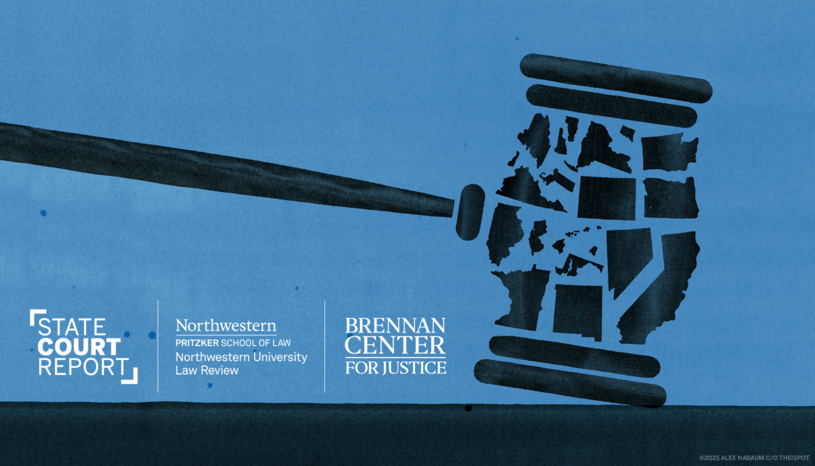Alicia Bannon
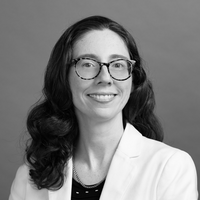
Alicia Bannon is the director of the Judiciary Program at the Brennan Center for Justice at NYU School of Law. An experienced constitutional lawyer and expert on the courts and access to justice in the legal system, she also serves as the editor in chief of State Court Report, a Brennan Center publication focused on state courts and state constitutional law, and directs the Brennan Center’s Kohlberg Center on the U.S. Supreme Court. Bannon regularly writes and comments for media outlets including The New York Times, The Washington Post, The Atlantic, Slate, MSNBC, and NPR, and she has authored numerous nationally recognized reports and legal articles. Prior to joining the Brennan Center, she was a John J. Gibbons Fellow in public interest and constitutional law at Gibbons PC in Newark, New Jersey, where she litigated a wide range of civil rights cases. After graduating from Harvard College summa cum laude with a degree in social studies and receiving her JD from Yale Law School, Bannon clerked for Justice Sonia Sotomayor at the U.S. Court of Appeals for the Second Circuit and for Judge Kimba M. Wood at the U.S. District Court for the Southern District of New York.
Megan Byrne
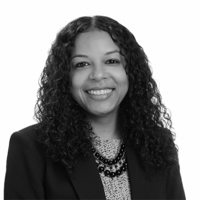
Megan Byrne is a senior staff attorney with the American Civil Liberties Union’s Capital Punishment Project, where she concentrates on racial disparities in capital punishment and the criminal legal system. Prior to joining the ACLU, she spent several years as an appellate public defender at the Center for Appellate Litigation, a non-profit public defense law firm that represents indigent clients in New York state court. She also served as a supervising attorney at the center and founded and directed its Racial Justice Project, which addresses recurring racial equity issues in criminal appeals. Before becoming an appellate public defender, Byrne worked as a litigation associate at Kirkland & Ellis, focusing largely on pro bono criminal appeals for indigent clients. Byrne graduated with pro bono distinction from Stanford Law School, having represented clients at the trial and appellate levels in the school’s Criminal Defense Clinic and spent a summer working for the New York Center for Juvenile Justice. She also holds a BA with high distinction in English and philosophy from Indiana University.
Ting Ting Cheng
Ting Ting Cheng directs the Equal Rights Amendment (ERA) Project at New York University School of Law’s Birnbaum Women’s Leadership Center. Her work centers on adding explicit gender equality to the U.S. Constitution and on the role of the ERA in advancing gender-based justice. Before joining the ERA Project, she litigated gender discrimination cases for Legal Momentum (formerly the National Organization for Women’s Legal Defense and Education Fund) and for New York City’s Human Rights Commission. She also served as the legal director of the 2017 Women’s March in Washington, DC, helping to organize the largest single-day protest in U.S. history. Cheng was previously a public defender and immigration attorney at Brooklyn Defender Services, which piloted the first universal representation model for immigrant defense in the United States. She received her JD from the City University of New York School of Law, after which she clerked at the Constitutional Court of South Africa for Justice Albie Sachs and Justice Edwin Cameron and was a Fulbright Scholar in South Africa.
Derek Clinger

Derek Clinger is a senior counsel at the University of Wisconsin Law School’s State Democracy Research Initiative, where his research focuses on elections, direct democracy, and separation of powers issues. Previously, he was a partner at McTigue Colombo & Clinger in Columbus, Ohio, where his practice focused on federal, state, and local election laws, campaign finance, statewide and local ballot initiatives and referenda, voting rights, ballot access, and government transparency. Clinger received his bachelor’s degree in Middle East studies and political science and his law degree from Moritz College of Law at The Ohio State University. While in law school, he was an intern with the ACLU Voting Rights Project and the Campaign Legal Center. Before practicing law, Clinger worked in the communications department of the Ohio Secretary of State’s office and also for several federal, state, and local political campaigns in Ohio.
Zachary Clopton
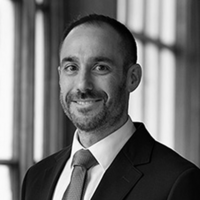
Zachary D. Clopton is the interim dean and Daniel Hale Williams Professor at Northwestern University’s Pritzker School of Law. A nationally recognized scholar of civil procedure, complex litigation, and international litigation, he joined the faculty as a professor of law in 2019 and has served in various roles, including associate dean of academic programs and associate dean of research and intellectual life. In 2023, Supreme Court Chief Justice John Roberts appointed Clopton to the Advisory Committee on Civil Rules. Prior to joining the Northwestern Law faculty, Clopton was an associate professor of law at Cornell Law School, a Public Law Fellow at the University of Chicago Law School, and an assistant U.S. attorney in Chicago. He has also worked in the national security group at WilmerHale in Washington, DC, and clerked for Judge Diane P. Wood of the U.S. Court of Appeals for the Seventh Circuit. He holds degrees from Yale University, the University of Cambridge, and Harvard Law School and is a member of the American Law Institute.
Wilfred Codrington

Wilfred U. Codrington III is the Walter Floersheimer Professor of Constitutional Law and codirector of the Floersheimer Center for Constitutional Democracy at Cardozo School of Law. He is also a non-resident fellow at the Brennan Center. A public law expert, his research, teaching, and advocacy focus on voting, elections, and the law of democracy; constitutional law, including constitutional theory and reform; and civil rights, antidiscrimination, and the role of race in the law. Codrington is the coauthor of The People’s Constitution: 200 Years, 27 Amendments, and the Promise of a More Perfect Union (2021). Prior to joining the Cardozo faculty in 2024, he was an associate professor of law and a Dean’s Research Scholar at Brooklyn Law School, a visiting associate professor of law at Texas A&M University School of Law, and an adjunct professor at the NYU Wagner School of Public Service. He was previously a fellow and staff attorney at the Campaign Legal Center, a staffer for U.S. Congresswoman Eleanor Holmes Norton, and a law clerk for Judge Deborah A. Batts at the U.S. District Court for the Southern District of New York. He holds degrees from Brown University, the University of Pennsylvania, and Stanford Law School.
Martha Davis

Martha F. Davis teaches constitutional law, state constitutional law, and U.S. human rights advocacy at the Northeastern University School of Law. She is a codirector of the law school’s Center for Global Law and Justice and its Program on Human Rights and the Global Economy. She is also the faculty director of the law school’s NuLawLab and an affiliated faculty member in Northeastern University’s Women’s, Gender, and Sexuality Studies Program. From 2022 to 2024, Davis was a visiting fellow at the recently renamed Carr-Ryan Center for Human Rights at Harvard University’s Kennedy School of Government. In 2015–16, she held the Fulbright Distinguished Chair in Human Rights and Humanitarian Law at the Raoul Wallenberg Institute (RWI) at Lund University in Sweden. She continued her work with RWI as a Fulbright Specialist in 2017–18 and is now an affiliated scholar of the institute. Davis was the first Kate Stoneman Visiting Professor of Law and Democracy at Albany Law School and has served as a fellow at the Bunting Institute (now the Radcliffe Institute for Advanced Study), the Human Rights Program at Harvard Law School, and the Women and Public Policy Program at Harvard’s Kennedy School of Government. She holds degrees from Harvard University, Oxford University’s Trinity College, and the University of Chicago and has written widely on human rights, women’s rights, and social justice issues.
Akilah Deernose

Akilah Deernose is the executive director of the ACLU of Montana. Growing up in a single-parent household at the intersection of poverty and race, she saw firsthand the many barriers to access, equity, and justice faced by a large portion of the population. After graduating with a bachelor’s degree in politics from Willamette University, she attended Santa Clara University School of Law, where she served on the student boards of the Black Law Student Association and the ACLU. She earned her JD (and the Outstanding Graduate Award) in 2009, after which she interned at the San Jose Public Defenders Office in both the juvenile justice division and on a felony trial calendar assignment, and also at the Silicon Valley Law Foundation’s Mental Health Advocacy Project. Prior to joining the ACLU of Montana, Deernose worked at the Montana Legal Services Association as a staff attorney, providing legal support and assistance to survivors of domestic violence.
Bridget Fahey

Bridget Fahey is a professor of law at the University of Chicago Law School. Her work on federalism documents and theorizes the unexpected ways in which the federal government and states interact and the unorthodox legal tools they use to structure their joint projects. She is also an affiliated scholar at the University of Chicago’s Data Science Institute and a codirector of the institute’s Data Ecology Research Initiative, where her research focuses on the legal and technical rules that structure the government’s access to and use of data and the manner in which the public law of data differs from the law governing other forms of power. Before joining the University of Chicago faculty, Fahey was a litigator at the Washington, DC, office of WilmerHale, prior to which she held a fellowship at the University of Pennsylvania Law School and clerked at the U.S. Court of Appeals for the DC Circuit and for Justice Sonia Sotomayor at the U.S. Supreme Court. Earlier in her career, she worked as a management consultant for the Boston Consulting Group in Chicago and Berlin. Fahey holds a BA in political science from the University of Chicago and a JD from Yale Law School.
Lucien Ferguson

Lucien Ferguson is an assistant professor of law at Chicago-Kent College of Law, where he teaches courses on constitutional law, labor law, local government law, and property law. His work focuses on social mobility and multiracial democracy in the United States, and his writing on these and related topics has appeared or is forthcoming in the Cardozo Law Review, the Mississippi Law Journal,the William & Mary Bill of Rights Journal, and Political Theory. His doctoral dissertation, titled “The Spirit of Caste: Recasting the History of Civil Rights,” received the American Political Science Association’s 2024 Edward S. Corwin Award for best doctoral dissertation in the field of public law. Ferguson was previously a Drinan Visiting Assistant Professor at Boston College Law School. Prior to joining academia, he worked in civil rights and community justice and as a special education teacher in Chicago. He received his JD cum laude from Northwestern University’s Pritzker School of Law, and he also holds an MA and PhD in political science from Northwestern and a BA in politics from Oberlin College.
Wendy Fields

Wendy Fields is the vice chair of the National Governing Board of Common Cause and is the principal at Fields Growth Strategies. She spent nearly two decades as a senior leader at the United Auto Workers International Union (UAW), where she made history as the first Black woman to lead national auto negotiations and the first woman to be named UAW chief of staff. Most recently, she served as chief of staff and strategic advisor at the Service Employees International Union (SEIU). She previously served as the executive director of the Democracy Initiative, a coalition of labor, civil rights, environmental, and social justice groups, where she led initiatives around pro-democracy and reform issues, voting rights, fair elections, and reducing the influence of money in politics, along with social justice and economic empowerment for working-class and marginalized communities, including communities of color.
Susan Frietsche
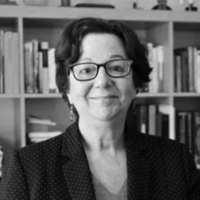
Susan J.(Sue) Frietsche is the executive director and director of litigation at Women’s Law Project and founder of the organization’s western Pennsylvania office. Her law practice focuses on providing legal services for Pennsylvania’s 18 freestanding abortion facilities, along with civil litigation and advocacy on issues ranging from LGBTQ discrimination to criminalization of pregnancy. Frietsche has argued before the U.S. Courts of Appeals for the Third and Fourth Circuits as well as Pennsylvania appellate courts. She is also an adjunct professor of law at the University of Pittsburgh School of Law, where she teaches a course on reproductive law and policy. She coauthored a chapter titled “Women on the Court and the Court on Women” in the 2018 book The Supreme Court of Pennsylvania: Life and Law in the Commonwealth 1684–2017 and a Yale Journal of Law and Feminism article titled “Preserving the Core of Roe: Reflections on Planned Parenthood v. Casey.” Frietsche holds a bachelor’s degree from Bryn Mawr College and a JD from Temple University’s Beasley School of Law.
Marcus Gadson
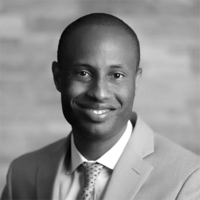
Marcus Gadson recently joined the University of North Carolina School of Law faculty as an associate professor of law. One of the nation’s leading authorities on state constitutions, he was previously an assistant professor of law at Campbell University’s Norman Adrian Wiggins School of Law, where he won Professor of the Year three times in a row. Gadson’s work has appeared in the NYU Law Review, the Michigan Law Review, and The Georgetown Law Journal. He is also the author of Sedition: How America’s Constitutional Order Emerged from Violent Crisis (2025), which argues that constitutional crisis has been a constant in American history and explains how that history affects Americans today. Gadson’s areas of expertise include civil procedure, constitutional law, and state and local government law. Before entering academia, he practiced at Steptoe & Johnson in Washington, DC. He clerked for Judge Bernice Donald of the U.S. Court of Appeals for the Sixth Circuit after graduating from Harvard Law School.
Michelle Garcia
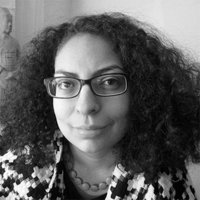
Michelle Garcia is a principal attorney for Navajo Nation. Formerly she served as the deputy director of New Mexico Legal Aid, a civil legal advocacy organization that strives to provide equal access to justice for disenfranchised and low-income people and communities throughout New Mexico where she oversaw the organization’s northern offices in Santa Fe, Taos, and Las Vegas and managed its LGBTQ+ legal access program, Safe to Be You, focused on civil rights litigation and advocacy for survivors of violence in rural and Indigenous communities in New Mexico. A graduate of Loyola University and member of the Pueblo of Pojoaque, she is admitted to the New Mexico Bar, the Navajo Nation Bar, the State Bar of Louisiana, and the Federal District Court for the District of New Mexico. After law school, Garcia worked as a prosecutor for the State of New Mexico and as a law clerk to the chief justice. She received the National LGBTQ+ Bar Association’s Legal Services Justice Award at the 2024 Lavender Law conference in Washington, DC.
Andrew Hammond

Andrew Hammond is an associate professor of law at Indiana University’s Maurer School of Law, where he writes and teaches in the areas of administrative law, civil procedure, and poverty law. His scholarship focuses on how agencies, courts, and legislatures respond to claims brought by the poor. His articles have appeared or are forthcoming in the California Law Review, The Georgetown Law Journal, the Michigan Law Review, the Northwestern University Law Review, and The Yale Law Journal, among other publications. Prior to joining the Maurer faculty, Hammond taught at the University of Florida Levin College of Law and at the University of Chicago’s college and law school. Before entering academia, he was a Skadden Fellow at the Shriver Center on Poverty Law in Chicago. He also clerked for Chief Judge Diane P. Wood of the U.S. Court of Appeals for the Seventh Circuit and for Judge Robert M. Dow of the U.S. District Court for the Northern District of Illinois. Hammond holds degrees from the University of Chicago, the University of Oxford, and Yale Law School.
Brian Highsmith

Brian Highsmith is an assistant professor of law at the UCLA School of Law and the Steven M. Polan Fellow in Constitutional Law and History at the Brennan Center. A PhD candidate in government and social policy at Harvard University, his research focuses on state constitutions, political geography, fiscal federalism, and local democracy. After graduating from Yale Law School, Highsmith worked in Washington, DC, in various domestic economic policy roles with a focus on income support programs and fiscal policy, including on President Barack Obama’s National Economic Council, at the Center on Budget and Policy Priorities, and in the office of Sen. Cory Booker. He was also a Skadden Fellow at the National Consumer Law Center. His writing has appeared in the Stanford Law Review, the Duke Law Review, Socio-Economic Review, Perspectives on Politics, The American Prospect, The New York Times, and Washington Monthly.
Roderick Hills
Roderick M. (Rick) Hills Jr. is the William T. Comfort III Professor of Law at New York University School of Law, where he teaches and writes on constitutional law, local government law, land use regulation, jurisdiction and conflicts of law, and education law. His recent work has focused on the politics and policy behind the centralization of banking regulation, the president’s role in suppressing states’ immigration policy, and the advantages of decentralization in educational policy. Hills has been a cooperating counsel with the ACLU for many years, filing briefs in cases challenging denial of domestic partnership benefits to same-sex couples, prison inmates’ exclusion from state antidiscrimination law protections, denial of prison inmates’ visitation rights, and public assistance discrimination of recently arrived indigent migrants. After receiving his BA from Yale University and his JD from Yale Law School, Hills clerked for Judge Patrick Higginbotham of the U.S. Court of Appeals for the Fifth Circuit and practiced law in Boulder, Colorado. His work has appeared in the Harvard Law Review, the University of Pennsylvania Law Review, the Michigan Law Review, the Stanford Law Review, the University of Chicago Law Review, and the Supreme Court Law Review.
Kara Ingelhart
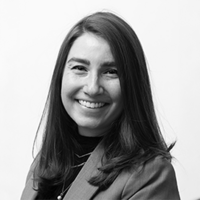
Kara Ingelhart is a clinical assistant professor of law and the founding director of the LGBTQI+ Rights Clinic at Northwestern University’s Pritzker School of Law. Her substantive areas of interest include low-income advocacy, criminal legal system reform, and public health law and policy issues that impact the LGBTQI+ community. Previously, she was an attorney with Lambda Legal Defense and Education Fund. Her recent litigation includes multiple challenges to discriminatory Department of Defense policies on behalf of transgender people and people living with HIV, along with suits across the country challenging discriminatory state ID laws and representing incarcerated transgender individuals in constitutional challenges. Ingelhart currently serves as a commissioner on the American Bar Association’s Commission on Sexual Orientation and Gender Identity. She holds a BA from Indiana University and a JD from the University of Chicago Law School and has been recognized by the National LGBT Bar Association as one of the Best LGBT Lawyers Under 40, and by Windy City Times as one of the Chicago LGBTQ Community’s Best and Brightest Individuals Under 30.
Michael Kang
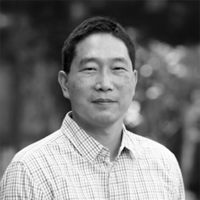
Michael S. Kang is the Class of 1940 Professor of Law at Northwestern University’s Pritzker School of Law, where his work centers on partisan gerrymandering, the influence of party and campaign finance on elected judges, the deregulation of campaign finance after Citizens United, and so-called sore loser laws that restrict losing primary candidates from running in the general election. A nationally recognized expert on campaign finance, voting rights, redistricting, judicial elections, and corporate governance, he is the coauthor of Free to Judge: The Power of Campaign Money in Judicial Elections (2023). The American Constitution Society profiled the book’s empirical work on judicial campaign ads and judges’ criminal law decisions in its 2014 report Skewed Justice. Its findings were also published in the Michigan Law Review and cited by Justice Ruth Bader Ginsburg in Williams-Yulee v. Florida Bar. In 2022, President Joe Biden appointed Kang to the Presidential Commission on the Supreme Court of the United States. After receiving his BA and JD from the University of Chicago, along with a PhD in government from Harvard University and an MA from the University of Illinois, he clerked for Judge Michael Kanne at the U.S. Court of Appeals for the Seventh Circuit and worked in private practice at Ropes & Gray in Boston.
Diana Kasdan
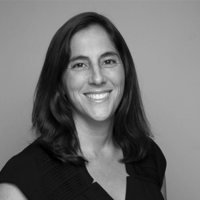
Diana Kasdan is the legal and policy director for the Center on Reproductive Health, Law, and Policy at the UCLA School of Law. Before entering academia, she was the director of U.S. judicial strategy at the Center for Reproductive Rights, where her work focused on building stronger constitutional jurisprudence and legal rights for reproductive autonomy. Previously, Kasdan litigated, advocated, and researched in the areas of reproductive rights, prisoners’ rights, and voting rights at the ACLU and at the Brennan Center. After receiving her JD from New York University School of Law, where she was a member of the NYU Law Review, a Hays Civil Liberties Fellow, and a student legal advocate in the Immigrant Rights Clinic and the Civil Rights Clinic, Kasdan clerked for Judge Nicholas G. Garaufis of the United States District Court for the Eastern District of New York. She also holds a BA from Washington University in St. Louis.
Melissa Long
Melissa A. Long is a justice on the Rhode Island Supreme Court, the first person of color to serve on the state’s high court. Prior to her elevation to the Supreme Court, Justice Long served for over three years as an Associate Justice of the Rhode Island Superior Court where she was assigned to various calendars in Providence County. Long chairs the Rhode Island Committee on Racial & Ethnic Fairness in the Courts. Before taking the bench, she served as Rhode Island’s deputy secretary of state. She received her BA from the University of Virginia and her JD from Antonin Scalia Law School at George Mason University, after which she clerked for Judge Marcus D. Williams of the Nineteenth Judicial Circuit Court of Virginia.
Marie Miller
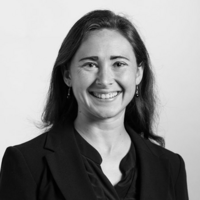
Marie Miller is an attorney with the Institute for Justice, where her practice focuses on immunity and accountability, property rights, and free speech rights. Miller received her law degree from Indiana University’s Maurer School of Law. She also holds master’s degrees in music and public affairs from Indiana University and a bachelor’s degree in music from the University of Notre Dame. After law school, Miller clerked for Chief Justice Loretta H. Rush of the Indiana Supreme Court and Judge Michael S. Kanne of the U.S. Court of Appeals for the Seventh Circuit. She is licensed to practice law in Indiana and Arizona.
Sean Morales-Doyle
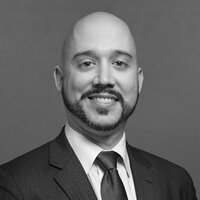
Sean Morales-Doyle is the director of the Brennan Center’s Voting Rights and Elections Program. A seasoned litigator with experience in civil rights and constitutional matters and a background in labor and employment law, he advocates for pro-voter reforms such as automatic voter registration and voting rights restoration while fighting back against voter suppression efforts in the courts. Prior to joining the Brennan Center, Morales-Doyle was a shareholder at Despres, Schwartz & Geoghegan in Chicago, where he litigated civil rights and constitutional matters and represented workers and unions in a wide variety of labor and employment cases. Morales-Doyle earned both his undergraduate and law degrees from Northwestern University. After law school, he worked as an assistant attorney general for Illinois in the Special Litigation Bureau, where he investigated and litigated cases involving consumer fraud and false claims. He then served as a law clerk to Judge William J. Hibbler of the U.S. District Court for the Northern District of Illinois.
Lalita Moskowitz

Lalita Moskowitz is a senior staff attorney for prisoners’ rights at the ACLU of New Mexico, where she litigates conditions of confinement issues including health care, excessive force, access to books, and solitary confinement. Her work focuses on fighting for stronger protections for incarcerated people under the state constitution. She also is an adjunct professor of law at the University of New Mexico School of Law, where she teaches a course on prisoners’ rights. Moskowitz started her legal career as an Equal Justice Works Fellow at the ACLU of New Mexico focusing on the unique challenges facing women in the state’s prisons and jails. She also worked as a law clerk for reproductive rights at the ACLU for two years before earning her JD from the University of New Mexico School of Law. Prior to law school, Moskovitz was a field organizer for Planned Parenthood of New Mexico and served as a team leader for the AmeriCorps National Civilian Community Corps. She holds a BA from Connecticut College.
Samira Nazem
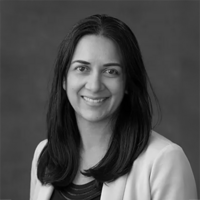
Samira Nazem is the interim deputy managing director of the Access to Justice team at the National Center for State Courts (NCSC), where her work focuses on expanding access to state courts for people without lawyers, people with disabilities, and people with limited English proficiency. She works closely with judicial officers, court administrators, and other justice stakeholders in areas including process design and improvement, communications and outreach strategies, delivery of self-help services, and other court reform efforts. Nazem also oversees NCSC’s Eviction Diversion Initiative, an $11 million grant program that supports state and local courts in designing, implementing, and evaluating eviction diversion programs and related court reform efforts. Prior to joining NCSC, she expanded self-help, legal aid, and pro bono resources and developed diversion and rental assistance programs for the Chicago Bar Foundation. Nazem began her legal career as a legal aid eviction defense attorney and has worked as a self-represented litigant services specialist at the Administrative Office of the Illinois Courts. She received her BA from Yale University and her JD from the University of Chicago Law School.
Rosemary Nidiry

Rosemary (Ruby) Nidiry is senior counsel in the Brennan Center’s Justice Program, where she directs the program’s Law Enforcement Leaders to Reduce Crime and Incarceration project. Before joining the Brennan Center, she was the deputy director of Fair and Just Prosecution, a national organization committed to moving beyond incarceration-driven approaches and fostering a smarter and more equitable justice system. Previously, Nidiry served for a decade and a half as an assistant U.S. attorney in the Southern District of New York. She also worked at the Office of Legal Counsel and the National Security Division of the U.S. Department of Justice and served as the director of criminal justice for the Laura and John Arnold Foundation. After graduating from Princeton University and Columbia Law School, she clerked for Judge Robert P. Patterson at the U.S. District Court for the Southern District of New York and for Judge Carlos F. Lucero at the U.S. Court of Appeals for the Tenth Circuit in Denver.
Jenny Notz
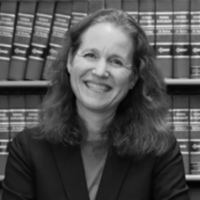
Jane Elinor (Jenny) Notz is the Illinois solicitor general. She oversees the work of the Illinois Attorney General’s Office’s Civil and Criminal Appeals Divisions in the state and federal courts of appeal, including the U.S. Supreme Court and the Illinois Supreme Court. Notz’s previous positions included first assistant corporation counsel and deputy corporation counsel for affirmative litigation at the City of Chicago’s Law Department, prior to which she served as deputy solicitor general for the Illinois Attorney General’s Office. Notz is a member of the American Law Institute and a six-time recipient of the Best Supreme Court Brief Award from the National Association of Attorneys General. She clerked for Judge Diane P. Wood of the U.S. Court of Appeals for the Seventh Circuit after graduating magna cum laude from the University of Pennsylvania and with high honors from the University of Chicago Law School, where she was a member of the University of Chicago Law Review editorial board and was selected for the Order of the Coif.
Allison Riggs
Allison Riggs is an associate justice on the North Carolina Supreme Court. Before her appointment by Governor Roy Cooper in 2023, she served as a judge on the North Carolina Court of Appeals. Prior to the bench, Riggs held several positions at the Southern Coalition for Social Justice, including co-executive director, chief counsel for voting rights, and senior staff attorney. She has been lead counsel in numerous voting rights cases as a civil rights litigator and community lawyer, twice arguing before the U.S. Supreme Court and numerous times before the North Carolina Supreme Court. Riggs received her BA, MA, and JD from the University of Florida.
Daniel B Rodriguez
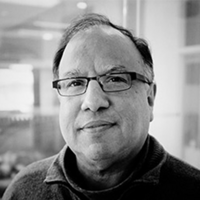
Daniel (Dan) B. Rodriguez is the Harold Washington Professor of Law at Northwestern University’s Pritzker School of Law and a former dean of the law school. His principal academic work is in the areas of administrative law, local government law, statutory interpretation, federal and state constitutional law, and the law-business-technology interface. He is the author of Good Governing: The Police Power in the American States (2024). Rodriguez previously held the Minerva House Drysdale Regents Chair in Law at the University of Texas at Austin School of Law and served as dean and Warren Distinguished Professor of Law at the University of San Diego School of Law. He has also been a research fellow at Rice University’s Baker Institute for Public Policy; a professor of law at the University of California, Berkeley School of Law; and a visiting professor at several top law schools, including Stanford, Harvard, Columbia, the University of Southern California, and the University of Virginia. He is a member of the American Academy of Arts and Sciences and a member of the American Law Institute. Rodriguez received his JD cum laude from Harvard Law School and his BA from California State University, Long Beach.
Anthony Sanders
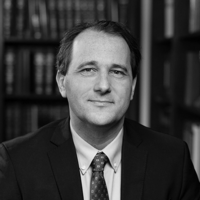
Anthony B. Sanders is the director of the Center for Judicial Engagement at the Institute for Justice and a senior attorney. He is the author of Baby Ninth Amendments: How Americans Embraced Unenumerated Rights and Why It Matters (2023). His work focuses on educating the public about the proper role of judges in enforcing constitutional limits on government’s size and scope. Sanders has litigated in various state courts in cases concerning state constitutional protections as well as in federal courts on matters such as economic liberty, free speech, administrative law, and fines and fees abuse. Prior to joining the Institute for Justice, he clerked for Justice W. William Leaphart at the Montana Supreme Court. Sanders also worked for several years in private practice in Chicago, where he was an active member of the Chicago Bar Association and chaired its Civil Rights Committee. He received his law degree cum laude from the University of Minnesota Law School in 2004, where he now serves as an adjunct professor of law for 2025–26, teaching a seminar on economic liberties.
Matthew Segal
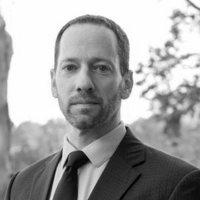
Matthew (Matt) Segal is a codirector of the ACLU’s State Supreme Court Initiative, which he helped launch in May 2023. He has successfully briefed state supreme court cases on a range of issues, including prosecutorial accountability and access to justice. Segel previously served as legal director of the ACLU of Massachusetts, where he argued cases that secured the release of more than 5,000 people from state prisons and jails during the Covid-19 pandemic; temporarily halted President Trump’s first travel ban; recognized state constitutional protection for cell phone location data; and dismissed more than 61,000 wrongful drug charges in the Sonja Farak and Annie Dookhan lab scandals — the single largest dismissal of wrongful convictions in U.S. history. Before coming to the ACLU, Segel spent four years as an assistant federal defender in North Carolina, where he argued cases at the U.S. Court of Appeals for the Fourth Circuit. He is a graduate of Brandeis University and Yale Law School, a member of the American Law Institute, and a former clerk to Judge Raymond Fisher of the U.S. Court of Appeals for the Ninth Circuit.
Miriam Seifter
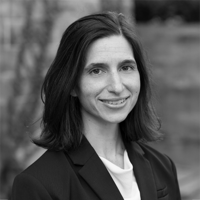
Miriam Seifter is the Richard E. Johnson Bascom Professor of Law, an H. I. Romnes Faculty Fellow, and co-director of the State Democracy Research Initiative at the University of Wisconsin Law School. Her research addresses questions of state and federal public law with a focus on challenges affecting democracy at the state level. After graduating from Harvard Law School, Seifter clerked for Chief Judge Merrick Garland at the U.S. Court of Appeals for the DC Circuit and for Justice Ruth Bader Ginsburg at the U.S. Supreme Court. Prior to joining the UW Law faculty, she was a visiting researcher and adjunct professor of law at Georgetown University Law Center and worked in private practice at Munger, Tolles & Olson in San Francisco. Seifter is the coauthor of the casebook State Constitutional Law: Cases and Principles (2025). She was named the 2017 winner of the American Constitution Society’s Richard D. Cudahy Writing Competition on Regulatory and Administrative Law for her Harvard Law Review article “Gubernatorial Administration,” and her Michigan Law Review article“Understanding State Agency Independence”won the American Bar Association’s 2020 Award for Scholarship in Administrative Law. In 2024, Seifter received the American Constitution Society’s Ruth Bader Ginsburg Scholar Award.
David Shapiro
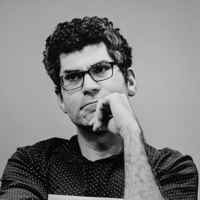
David Michael Shapiro is the executive director of the MacArthur Justice Center. He previously worked at the center for more than a decade, founding and directing its Supreme Court and Appellate Program, which Bloomberg Law honored in 2022 as a Pro Bono Innovator. Prior to rejoining the center, he was the executive director of Chicago Lawyers’ Committee for Civil Rights. Shapiro has argued civil rights cases in courts across the nation, including the U.S. Supreme Court, the Illinois Supreme Court, and the U.S. Court of Appeals for the Seventh Circuit. His work on civil rights, incarceration, and policing has appeared in the Harvard Law Review, the Notre Dame Law Review, and The George Washington Law Review, among others, and he coauthored a textbook on prisoners’ rights and civil rights litigation training for federal court staff through the Federal Judicial Center. In 2024, he received the Abner Mikva Award from the American Constitution Society’s Chicago Lawyer Chapter. A former Fulbright Scholar and graduate of Harvard College and Yale Law School, Shapiro clerked for Judge Edward R. Becker at the U.S. Court of Appeals for the Third Circuit.
Adam Sopko
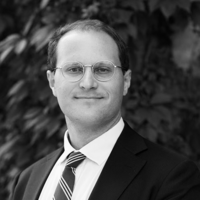
Adam Sopko is an associate professor of law at the University of Colorado Law School. His research explores questions of state constitutional law with a focus on the role of state institutions in governance and policymaking, and he teaches classes on state constitutional law, state and local government, and evidence. Before joining the Colorado Law faculty, Sopko was a staff attorney at the University of Wisconsin Law School’s State Democracy Research Initiative, where his research and amicus practice addressed questions of state public law and democracy. He received his BS from Manhattan College and his JD from Northwestern Pritzker School of Law, where he was editor in chief of the Northwestern University Law Review.Following law school, he clerked for New Jersey Supreme Court Chief Justice Stuart J. Rabner. Sopko’s work has appeared or is forthcoming in the Northwestern University Law Review, the Southern California Law Review, and the North Carolina Law Review, among other journals.
Julia Spiegel

Julia Spiegel is the founder and CEO of the Governors Action Alliance (GovAct), a nonprofit, nonpartisan initiative that helps governors work across state lines to protect fundamental freedoms. Prior to launching GovAct in 2024, as legal counsel to California Gov. Gavin Newsom when the U.S. Supreme Court overturned Roe v. Wade, Spiegel launched the Reproductive Freedom Alliance, bringing 23 governors together to fight for reproductive freedom in a post-Roe America. She has previously litigated high-profile cases on immigration, voting rights, and other social justice matters for the Santa Clara County Counsel’s Office; served as senior advisor to U.S. Ambassador to the United Nations Samantha Power; clerked for Judge M. Margaret McKeown at the U.S. Court of Appeals for the Ninth Circuit; and taught courses on foreign affairs and the U.S. Constitution at Stanford Law School and on U.S. foreign policy at Stanford’s Freeman Spogli Institute for International Studies. Spiegel holds a BA from Stanford University, an MPP from the Princeton University School of Public and International Affairs, and a JD from Yale Law School.
Jeffrey S Sutton

Jeffrey S. (Jeff) Sutton is the chief judge of the U.S. Court of Appeals for the Sixth Circuit and the current executive committee chair of the Judicial Conference of the United States. He has served as chair of the federal Judicial Conference’s Committee on Rules of Practice and Procedure and its Advisory Committee on Appellate Rules, and he has also chaired the Supreme Court Fellows Commission. Since 1993, Sutton has been an adjunct professor at The Ohio State University’s Moritz College of Law, where he teaches seminars on state constitutional law, the Supreme Court, and appellate advocacy, and he teaches a class on state constitutional law at Harvard Law School. Among other publications, he is the author of Who Decides? States as Laboratories of Constitutional Experimentation (2021) and 51 Imperfect Solutions: States and the Making of American Constitutional Law (2008); coauthor of State Constitutional Law: The Modern Experience (2023) and The Law of Judicial Precedent (2016); and coeditor of The Essential Scalia: On the Constitution, the Courts, and the Rule of Law (2020). A member of the American Law Institute, Sutton earned his law degree from the Moritz College of Law and clerked for Judge Thomas Meskill of the U.S. Court of Appeals for the Second Circuit, as well as for U.S. Supreme Court Justices Lewis F. Powell Jr. and Antonin Scalia.
Karen Thompson
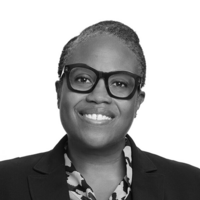
Karen (KT) Thompson is the legal director of Pregnancy Justice, where she leads a team of attorneys advocating for those criminalized because of their pregnancies or pregnancy outcomes. Before joining Pregnancy Justice, Thompson litigated civil rights and liberties cases as a senior staff attorney at the ACLU of New Jersey and worked as a senior staff attorney at the Innocence Project, representing wrongfully convicted clients in Arkansas, Oklahoma, Pennsylvania, South Carolina, and West Virginia. Earlier in her career, as an associate at Morrison & Foerster and at Orrick, Herrington & Sutcliffe, she maintained a rigorous criminal defense pro bono practice in addition to her international arbitration docket; she also held a director role at the Legal Defense Fund. Thompson holds a BA inEnglish and African American studies from Carleton College, an MA from New York University’sDepartment of Performance Studies, and a JD from Northwestern University’s Pritzker School of Law.
Deborah Tuerkheimer

Deborah (Deb) Tuerkheimer is the Class of 1967 James B. Haddad Professor of Law at Northwestern University’s Pritzker School of Law, where she teaches and writes in the areas of criminal law, evidence, and feminist legal theory. Before joining the Northwestern Law faculty in 2014, she was a professor of law at DePaul University College of Law and the University of Maine School of Law. She is the author of Credible: Why We Doubt Accusers and Protect Abusers (2021) and Flawed Convictions: “Shaken Baby Syndrome” and the Inertia of Injustice (2014) and a coauthor of the casebook Feminist Jurisprudence: Cases and Materials (2018), and she has published numerous articles on sexual violence and domestic violence. After clerking for Alaska Supreme Court Justice Jay Rabinowitz, she was an assistant district attorney in Manhattan, where she specialized in domestic violence prosecution. Tuerkheimer is a member of the American Law Institute. She holds degrees from Harvard College and Yale Law Scho
Andrew Ward

Andrew Ward is a senior attorney with the Institute for Justice and a leader in its Fresh Start practice, which challenges laws that unfairly prevent people with criminal records from finding employment. Ward successfully led the institute’s first Fresh Start case, which helped inspire reforms eliminating vague “good moral character” requirements throughout Pennsylvania. He also second-chaired DeVillier v. Texas, the U.S. Supreme Court case that established Texans’ right to bring claims against the state under the Fifth Amendment’s Takings Clause. Before joining the Institute for Justice, Ward clerked for Judge Edward Korman of the U.S. District Court for the Eastern District of New York. He has also served as a law clerk to Judge Raymond Gruender of the U.S. Court of Appeals for the Eighth Circuit and worked as a litigation associate at the New York office of Sullivan & Cromwell. Ward received his law degree magna cum laude from New York University. He holds undergraduate degrees in mathematics, physics, and English.
Whit Washington
Whit Washington is a senior attorney for the Lambda Legal Defense and Education Fund’s Nonbinary and Transgender Rights Project. As an Equal Justice Works Fellow prior to joining Lambda Legal, they launched an initiative to expand access to justice for transgender people in custody, developing legal resources, corresponding with hundreds of incarcerated trans people, and mobilizing pro bono legal networks. Following their fellowship, Washington worked as a staff attorney at the Miss Major Alexander L. Lee TGIJP Black Trans Cultural Center, where they developed legal resources for transgender individuals in custody, coordinated a coalition of advocates, and established a pro bono program that engaged both law students and attorneys. Washington is a former Trans Lifeline board member and currently serves on the board of the National Trans Bar Association. They hold degrees from the Johnston Center for Integrated Studies at the University of Redlands, the American University School of International Service, and the American University Washington College of Law. Their work has been featured by the National LGBTQ+ Bar Association and Washington Lawyer magazine, and they have received the 40 Under 40: Queer Women of Washington award from the DC Mayor’s Office of LGBTQ Affairs.
Elizabeth Welch

Elizabeth M. Welch is an associate justice on the Michigan Supreme Court. She also serves as the justice liaison to Judicial Information Services, a division of the court’s administrative agency that handles data gathering and e-filing programs, and co-chairs the court’s diversity, equity, and inclusion commission. She previously served as a liaison to the Michigan Judicial Institute and on various committees for the court’s Justice for All Commission. Welch holds a JD from Moritz College of Law at Ohio State University and a BA from Penn State University. Prior to joining the court, she was a local school board trustee and worked for more than 15 years on public education and voting rights policy. She is currently vice president of the Steelcase Foundation and an ambassador for the Grand Valley University Foundation, and she has received several awards for her public school and other community work.
Kathrina Szymborski Wolfkot

Kathrina (Kasia) Szymborski Wolfkot is senior counsel in the Brennan Center’s Democracy Program, where she works to realize a fair and inclusive judicial system that protects fundamental rights, democratic values, and the rule of law. She is also the managing editor of State Court Report, a Brennan Center publication focused on state courts and state constitutional law. Wolfkot previously worked as an appellate attorney at the MacArthur Justice Center challenging inhumane conditions, poor medical care, and violence in jails and prisons across the country. She also litigated issues related to access to courts for incarcerated people, excessive sentencing, and wrongful conviction. Before entering public service, Wolfkot managed pro bono clemency and parole projects at Patterson Belknap Webb & Tyler, securing multiple sentence commutations from New York’s governor for people serving decades-long sentences and obtaining parole release for several people sentenced to life in prison. After graduating from the University of Michigan Law School, she clerked for Judge Carl E. Stewart of the U.S. Court of Appeals for the Fifth Circuit. Prior to law school, Wolfkot graduated from Skidmore College and worked as a journalist in Moscow.
Evan Wolfson
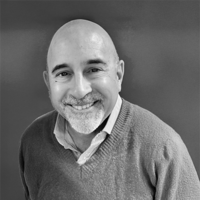
Evan Wolfson is the founder and former president of Freedom to Marry, the campaign that led to marriage equality in the United States. Prior to founding Freedom to Marry in 2001, he served as co-counsel in the historic Hawaii marriage case that launched the ongoing global movement for the freedom to marry. He is the author of Why Marriage Matters: America, Equality, and Gay People’s Right to Marry (2004). Among other awards and distinctions, he received the Presidential Citizens Medal — one of the highest civilian honors in the United States — from President Joe Biden in 2025. Wolfson now devotes his time to advising and assisting diverse movements and causes in the United States and around the world that seek to adapt the model and apply the lessons of the Freedom to Marry campaign. He has taught law and social change as a Distinguished Visitor from Practice at the Georgetown University Law Center and as a Distinguished Practitioner in Grand Strategy at Yale University. Wolfson currently serves as senior counsel at Dentons and directs a team of Freedom to Marry alumni-experts coaching human rights efforts worldwide under the banner of Freedom to Marry Global. He holds degrees from Yale College and Harvard Law School.
Quinn Yeargain

Quinn Yeargain is the 1855 Professor of the Law of Democracy and an associate professor of law at Michigan State University College of Law, where they teach courses on constitutional and criminal law. Prior to joining the MSU Law faculty, Yeargain taught at the Widener University Commonwealth Law School in Harrisburg, Pennsylvania. They graduated from Emory University School of Law and subsequently clerked for Judge Lanier Anderson at the U.S. Court of Appeals for the Eleventh Circuit. Yeargain’s research focuses on institutional changes in state constitutions through amendments, the use of democracy to expand and contract state constitutional rights and liberties, and the effect of democracy on the operation of the carceral state. They are a coauthor of State Constitutions: Institutions, Powers, and Rights, a state constitutional law casebook soon to be published by West Academic Publishing; a frequent contributor to Bolts, State Court Report, and other publications; and a regular guest on state and national TV and radio shows.
